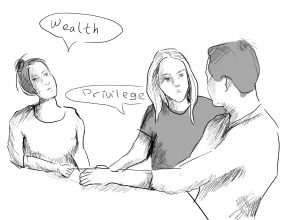Discussing Wealth and Privilege
April 7, 2019
I don’t know how to talk about money. For something that is so ubiquitous in our experience as college students, as people in a capitalist society, we skirt around the subject quite often. I don’t know what kind of language to use when talking about money— financial matters are both amazingly private and unavoidably public. Even though I don’t know what to say, I am compelled to write about finances because there are no conversations around affluence at Whitman— at least, it does not feel that way.
I say we don’t talk about money, but perhaps I am overgeneralizing. Some of us do talk about money, and quite often, because we have to. For some, financial security is of constant discussion, because it is something that we don’t consistently have. However, these are not the students I am speaking to. I am speaking to the rich Whittie.
Who is the rich Whittie? One who can afford to eat downtown on a regular basis. One who has health insurance. One who can afford an unpaid internship. One who doesn’t have to take out college loans. One who can go on an endless number of OP trips. One who doesn’t worry about the size of their financial aid package. Most students here don’t think about financial availability, access and limitations. They don’t need to. My rich friends at Whitman either don’t know they are rich, or they feel incredibly guilty about it.

Some do not even know we have the First Generation/Working Class (FGWC) Program. The fact that the FGWC program exists says a great deal about the goals of the college — Whitman is trying to attract more socioeconomically diverse students, and it shows, but this does not mean the campus culture is conducive to this kind of growth. This does not mean students are making the same efforts to be more inclusive, or at the very least, aware of different economic situations.
Even being middle class here makes me feel poor. But I’m not poor. I am not FGWC. I am staunchly and unapologetically middle class. I am not without socioeconomic privilege, but I still feel out of place here. I feel strange writing about this topic because I am not the most affected by this issue — I am affected, for sure, but nowhere near as much as my FGWC classmates. However, it is not the disadvantaged student’s job to educate wealthy students about their plight. FGWC students are not the only ones who should be talking about this — we all share responsibility for the culture we have created, and we all share responsibility in addressing its problematic nature.
There is a general lack of communication between affluent students and less financially stable students. We tend to spend our free time with like-minded people, but this often translates to like-moneyed people. I hang out more with FGWC and middle-class students because I understand them better. We have shared life experiences. We get each other’s financial stress.
I’m not asking you to check your privilege — you should already be doing that. I’m also not asking you to announce your current bank account balance from the middle of Ankeny. I want to start a conversation about finances, about situation and privilege. Various student groups have worked to achieve this end, but I have yet to see any major shifts within the student body at Whitman. We cannot afford to stay silent about this. Hopefully, together, we will be able to find the words.





